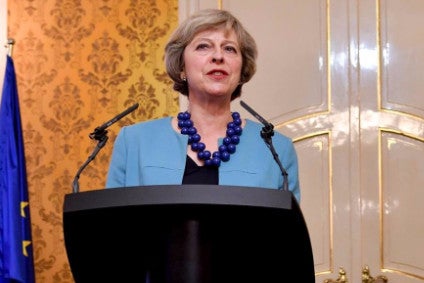
Imports into the UK of certain apparel, including men’s or boy’s cotton shirts and swimwear, would be subject to tariffs in the event of a no-deal Brexit, the country’s government announced this morning (13 March) – but the vast majority of products would enter tariff free.
While 87% of all imports by value into the UK would be eligible for zero-tariff access, tariffs would still apply to 13% of goods, including some apparel items. The UK’s temporary import tariffs will not apply to goods crossing from Ireland into Northern Ireland.
The move follows the vote in the House of Commons last night (12 March) in which UK Prime Minister Theresa May’s Withdrawal Bill was defeated by 149 votes. With just 16 days to go before the UK is scheduled to leave the EU, a no-deal Brexit – which in part means no trade deal between the UK and the EU bloc – is now a real possibility.
If that were to happen, the UK would default to World Trade Organization (WTO) trading rules. The UK, as a WTO member, would have to present a ‘schedule’ of tariffs which would then have to be the basis of all future trade deals.
In a statement, the government said its temporary tariff regime for a no-deal scenario is designed to “minimise costs to business and consumers while protecting vulnerable industries.”
It said the regime is temporary and insisted it would closely monitor the effects of these tariffs on the UK economy. The regime would apply for up to 12 months while a full consultation and review on a permanent approach to tariffs is undertaken.

US Tariffs are shifting - will you react or anticipate?
Don’t let policy changes catch you off guard. Stay proactive with real-time data and expert analysis.
By GlobalDataThe tariffs that would still apply to 13% of goods imported into the UK, would be a percentage of the EU’s “most favoured nation” level – a World Trade Organization measure.
The majority of apparel items listed in the government document would be levied at a rate of 12% of the “relevant EU” most-favoured nation rate. They include, to name just three, men’s or boy’s swimwear (excluding knitted or crocheted); men’s or boy’s shirts of cotton knitted or crocheted (excluding nightshirts, T-shirts, singlets, and other vests); and women’s or girl’s jerseys, pullovers, cardigans, waistcoats, and similar articles of cotton knitted or crocheted (excluding lightweight fine knit roll, polo or turtleneck jumpers and pullovers and wadded waistcoats).
Meanwhile, for babies’ gloves, mittens, and mitts of cotton knitted or crocheted, and gloves, mittens, and mitts for babies of synthetic fibres knitted or crocheted, it would be 8.9% of the relevant EU rate.
For bras of all types of textile materials, whether or not elasticated, including knitted or crocheted, it would be 6.5%.
An analysis shows that around 75% of the apparel tariff lines will be duty-free. This include 113 out of the total 148 tariff lines (8-digit HS code) in Chapter 61 (knitted apparel); and 145 out of the total 194 tariff lines (8-digit HS code) in Chapter 62 (woven apparel).
“If we leave without a deal, we will set the majority of our import tariffs to zero, whilst maintaining tariffs for the most sensitive industries,” said trade policy minister George Hollingbery. “This balanced approach will help to support British jobs and avoid potential price spikes that would hit the poorest households the hardest.
“It represents a modest liberalisation of tariffs and we will be monitoring the economy closely, as well as consulting with businesses, to decide what our tariffs should be after this transitional period.”
If the UK leaves the EU without a deal, the temporary tariff rates would be implemented from 11pm on 29 March 2019.
Other than the MFN rates, the UK will offer preferential tariff duty rates for apparel exports from countries and/or programmes including Chile (zero tariff), ESA countries (zero tariff), Faroe Islands (zero tariff), GSP scheme (reduced tariff rate), Israel (zero tariff), Least Developed Countries (LDC) (zero tariff), Palestinian Authority (zero tariff), and Switzerland (zero tariff).
But the UK’s exports to EU members as well as to Japan, Canada and the US will be subject to these countries’ MFN rate.
Little time to prepare
“This is a very significant change and if we do leave without a deal, leaves businesses with very little time to prepare. There will be product on the water now that will be affected by these potential changes,” said Adam Mansell, CEO of the UK Fashion & Textile Association (UKFT), which brings together 2,500 designers, manufacturers, agents, and retailers to promote their businesses and the wider industry.
“It is also a very mixed bag for the fashion and textile sector. We welcome the government’s commitment to help developing countries through the continuation of the GSP scheme but the reality of a no-deal Brexit, at least in the short term, is that for example, Italian wool fabric can enter the UK duty free, while our woollen and worsted manufacturers would face an 8% duty rate selling in to Italy.
“We are also very concerned that the government has completely failed to replicate the deal the EU currently has with Turkey. Turkey is a major supplier to the UK fashion industry and under this proposal many imports from Turkey would be 12% more expensive overnight.”
Last month, the British government has admitted that time has run out for the UK to transition existing trading arrangements with countries including Japan and Turkey in the event of a no-deal Brexit, meaning trade would take place under World Trade Organization rules.




